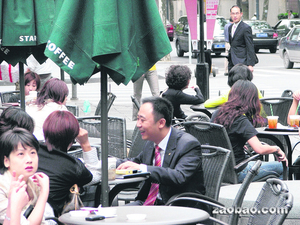Coffee is changing Chinese society and culture.

There are more and more desktop and American cafes and restaurants in cities, changing the life, social and business habits of Chinese urban people. (photo by Fu Miaoxin)
The cafe culture that appeared in Shanghai a hundred years ago during the concession era has shown increasing signs of rebirth in recent years. According to the Shanghai Food Association, there are now more than 12,000 stores selling coffee in Shanghai, with nearly 100000 employees.
Reporting by Chen Yingzhu
Shanghai special commissioner
Chinese people drink tea not only for their physical needs or traditional culture, but also as a way to socialize, but coffee and cafes are bringing about significant changes in social culture.
The Shanghai Food Association recently released a report on "30 years of Shanghai Food", showing that in 2010, the coffee-based catering industry was second only to dinner restaurants in sales, accounting for 17.2% of the industry's total sales. But the profit of the coffee shop is as high as 16.37%, which is much higher than the 10.6% of the average profit of the entire catering industry.
The report is confirmed by cafes commonly seen in cities across China in recent years. The cafe culture, which appeared in the "concession era" a hundred years ago, has shown more and more signs of rebirth in recent years. The Food Association reports that there are now more than 12,000 stores concurrently engaged in coffee in Shanghai, with nearly 100000 employees.
Taiwan's duplex coffee industry, cross-strait coffee, has 560 stores across the mainland, and there are thousands of stores across the mainland, which are also combined with diversified Taiwanese brands such as Dio Coffee and Shangdao Coffee. Starbucks, the most famous American brand, has 100 stores in Shanghai alone, while another American brand, fragrant coffee, says it will increase the number of stores from dozens to 200 within three to five years.
Cafes blossom everywhere
Wang Jingying, president of Starbucks China, said last year that China has become Starbucks' largest market outside the United States, opening more than 200 stores a year and reaching 1500 by 2015.
Starbucks recently announced an increase in the price of coffee. Chen Ying, a 25-year-old Shanghai office worker who works in marketing, said: "just two more yuan!" The price of everything has risen. " She and her mother both drink coffee at home, while her father drinks more tea.
Chen Ying said that he usually drinks coffee when he goes out with friends and colleagues: "I feel that the atmosphere of the coffee shop is more suitable for young people, but the tea shop looks dull." She drinks Starbucks coffee once or twice a week, spending about 200 to 300 yuan a month (RMB, the same below, about S $40 to S $60).
In terms of shop opening and consumption scale, coffee, a western-style drink, has become popular all over China. Li Guoyan, deputy general manager of cross-strait coffee, told this newspaper that a high proportion of young to middle-aged people accept coffee. Like many desktop coffee shops on both sides of the strait, they sell coffee-based beverages, but he notes that in the past three years, the proportion of coffee sales in all kinds of drinks has doubled from 30% to about 60%. The company used 106.7 tons of coffee beans last year, an increase of 13.6 tons, or 14 percent, over the year before.
Industry insiders point out that the profit of beverages is already high, with the cost of materials for a cup of coffee worth 20 or 30 yuan less than 15%. Therefore, in the report of the Shanghai Food Association, it is not surprising that the profit of the coffee industry is "proud of group drinking". Li Guoyan even pointed out that the long business hours of duplex restaurants that mainly sell coffee also contribute to the growth of profits.
Li Guoyan analyzed that the duplex coffee shop can do five kinds of customer business: those who eat breakfast coffee; office workers or business guests who eat lunch; guests who drink afternoon tea, talk business, rest or simply surf the Internet; dinner parties; and midnight snacks for friends.
What is more noteworthy is the rapid formation of coffee culture and the changes it brings.
The business model of long-term supply has changed the living habits of urban residents, and it also shows that business and consumption are booming. Excluding alcohol consumption, social and leisure drinks have been tea-based in the past, with a variety of coffee options full of imaginative space.
Wang Xiaoyu, a cultural scholar at Tongji University, believes that coffee, as a beverage of choice, does not conflict with tea. He drinks more tea at home, but often goes to cafes when he goes out. One of the reasons is that there are fewer and fewer teahouses.
The difference between teahouses and cafes is the real cultural issue. "the caf é provides casual and comfortable space for public communication," he said. "it would be nice if the teahouse could be opened in a more public-like atmosphere. Chinese teahouses used to be the same, but now they are not. In turn, the functions of Chinese teahouses are assumed by cafes. The question now is how can the teahouse restore this function. "
Tea is China's "national drink", and many people are used to taking bottled tea with them to quench their thirst when they go out. For many consumers, coffee may still be one of the ways of urban life, and it has not yet risen to the status of necessities. Apart from the reasons of traditional habits, according to general understanding, coffee is not as healthy as tea. In addition, coffee is still a bit too expensive compared to low-and middle-income people.
People who study the history of the relevant industry believe that coffee is still inferior to tea art in Japan, other people who drink tea for health and health care are also gradually increasing, and the increasing sales of modern tea drinks show that tea itself is not in crisis. Therefore, although coffee is menacing, it is "western learning for use" at most, and it cannot shake the national foundation of the tea ceremony.
China Coffee Trading Network: www.gafei.com
Important Notice :
前街咖啡 FrontStreet Coffee has moved to new addredd:
FrontStreet Coffee Address: 315,Donghua East Road,GuangZhou
Tel:020 38364473
- Prev

Coffee latte printer
A Taiwanese beverage company called Let's Coffee has developed a new machine that can print photos to lattes, according to foreign media reports.
- Next

Nestle wants to "add weight" to China's coffee market development
Recently, Nestlé (NESN.VX), the world's largest food company, has made frequent expansion actions in China. In addition to continuously acquiring domestic enterprises, it has also directly increased its main business segments including coffee, in order to rapidly increase the proportion of its business in China. Nestle Greater China President Di Kewei told China Securities News on the 22nd that China has become the world's second largest economy and represents the Chinese market
Related
- Can I make coffee a second time in an Italian hand-brewed mocha pot? Why can't coffee be brewed several times like tea leaves?
- Hand-brewed coffee flows with a knife and a tornado. How to brew it? What is the proportion of grinding water and water temperature divided into?
- What is the difference between Indonesian Sumatra Mantinin coffee and gold Mantinin? How to distinguish between real and fake golden Mantelin coffee?
- What does bypass mean in coffee? Why can hand-brewed coffee and water make it better?
- Unexpected! Ruixing Telunsu lattes use a smoothie machine to foam milk?!
- % Arabia's first store in Henan opens into the village?! Netizen: Thought it was P's
- Does an authentic standard mocha coffee recipe use chocolate sauce or powder? Mocha Latte/Dirty Coffee/Salty Mocha Coffee Recipe Share!
- What is the difference between Vietnam egg coffee and Norway egg coffee? Hand-brewed single product coffee filter paper filter cloth filter flat solution!
- What is the difference between sun-cured and honey-treated coffee? What are the differences in the flavor characteristics of sun-honey coffee?
- How to make Italian latte! How much milk does a standard latte use/what should the ratio of coffee to milk be?

